Meet the three most average Dutch students
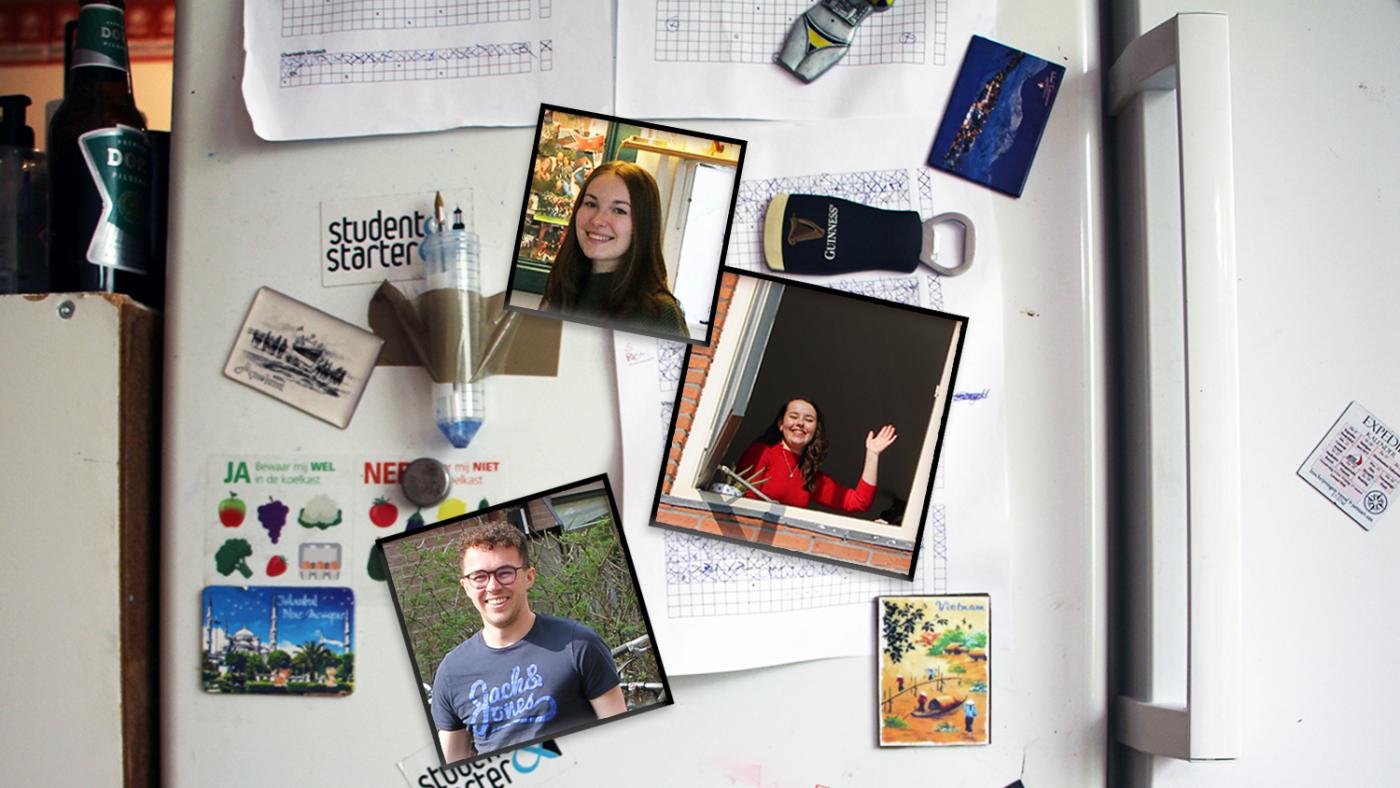
The media is full of articles about excelling students. With its annual list of 15 promising students, DUB is no different. But Utrecht University itself does the same, with its prizes for outstanding theses and students whose extracurricular activities are considered a valuable contribution to society. But the vast majority of students do not make headlines. Who are they? To answer this question, DUB devised two questionnaires to find the most average UU student — one for Dutch students and another one for international students. Alice Pravato, from Italy, was crowned the most average international student. Now it's time to meet the Dutch one.
According to national statistics and data from the university and the municipality, the average Dutch-speaking UU student is likely to be a 22-year-old woman sharing a house with other students. She is not a member of any sports club or sorority. Her average grade is 7. But, apart from that, there was a lot we did not know, like how often the average student had to go into quarantine or what their favourite drink is. While we did, of course, have our suspicions, we had to substantiate them by means of a survey.
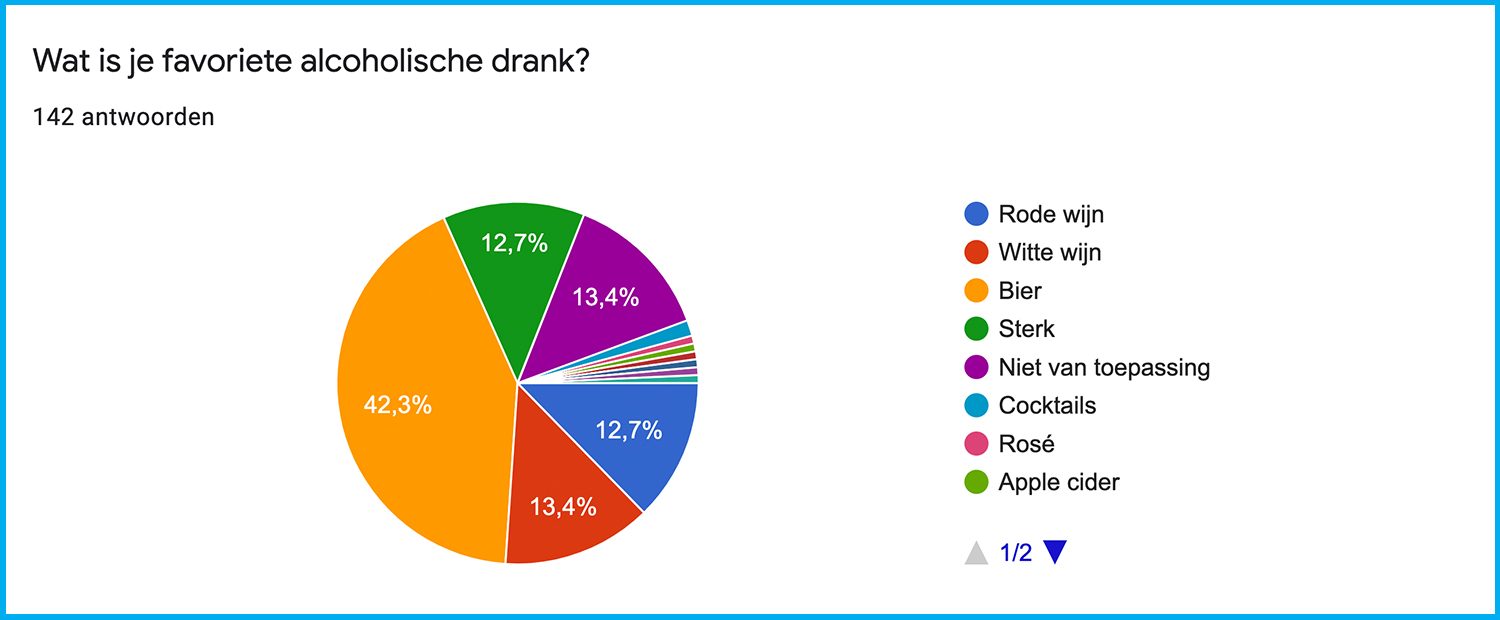
Asked what their favourite alcoholic drink is, the vast majority of Dutch students answered "beer" (42.3 percent). White wine, spirits and "not applicable" share the second place, with approximately 13 percent each.
A total of 142 students answered the Dutch survey. Their answers show that the ultimate average student did not enter the competition. Out of those who did participate, not one person achieved a score of 100 percent. Is that surprising? Not really, according to average student Quinten Stekelenburg. “Research has shown that the average person doesn’t exist. The more characteristics you include in the survey, the less likely you are to find someone who meets all the criteria.” That is DUB has chosen three Dutch students to receive the prize. Of the ones closest to the average, they were the ones who agreed to an interview and a picture.
Number 3, Quinten: ’Sometimes I feel like an imposter’
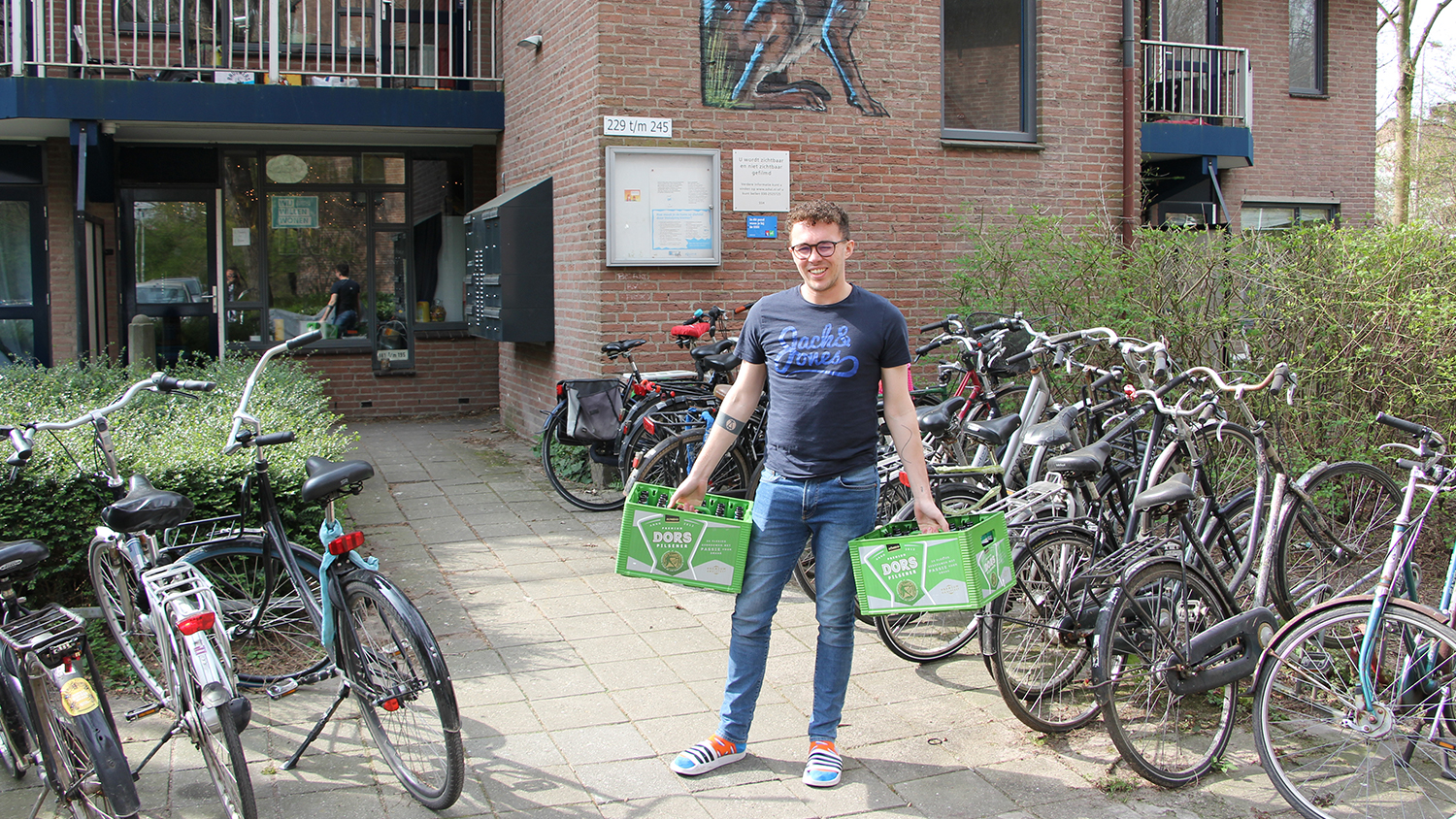 Average student Quinten Stekelenburg holding the beer crates he has to restock every week
Average student Quinten Stekelenburg holding the beer crates he has to restock every week
Of all the Dutch men who completed our questionnaire, Quinten scored the highest number of points and even made it to the top 10, although being a woman was worth an extra point. He filled out the questionnaire just for fun. As a 26-year-old man with a tattoo on his arm, one would not expect him to be the prototypical Utrecht student. Nor is his trajectory a particularly average one. He obtained his Bachelor’s degree at a university of applied sciences in Rotterdam. Back then, he was living in a social home (housing meant for people with lower incomes, Ed.) in IJsselstein, a city in the province of Utrecht. At the end of his studies, he moved to Sweden to work for a company, about which he wrote his undergraduate thesis. Two years later, he came back to the Netherlands to pursue a Master’s degree in Artificial Intelligence. Today, he lives in an SSH house on Enny Vredelaan Avenue, between the city centre and the Utrecht Science Park. He shares it with seven roommates.
That's why Quinten only feels like a student now. "During my Bachelor’s, I missed living in a student house. Eating together, having drinks, spontaneous get-togethers... I also lived on my own in Sweden.” Because he will continue studying for at least another year, he can stay in his current room until 2024. “I’m the one who restocks all the beer crates and sometimes I think: 'come on guys, try to keep things a bit cleaner'. But then I always remind myself: 'oh well, it’s a student house'.”
Besides having fun with his housemates, Quinten loves to programme, something he does not only for his studies but for his job as well. He is still working for the same Swedish company that inspired his thesis, Furhat Robotics. Furhat is a social robot with human characteristics — Quinten has a model of it in his crowded student room. He also helps volunteers for the left-wing political party Bij1, working for the data science department. His political affiliation is more left-leaning than that of the average Utrecht student (who votes for central-left parties D66, GroenLinks and Volt), which is why his roommates call him "the most woke person in the house".
Despite all the programming, Quinten only spends 7 hours of his day sitting down. That is not much, compared to the average student, who spends 11 hours a day in that position, according to the National Institute for Public Health and the Environment (RIVM). How come? Quinten explains that he's also a volleyball player, referee and coach, so he almost every night and at least one whole day in the weekend away from home. He is also a volunteer Dutch teacher to international students, which requires him to spend a significant amount of time standing in front of a classroom. There seems to be no end to his extra-curricular activities. “I know it looks good on my CV, but that’s not why I do it", he swears. "I just really enjoy all of it.”
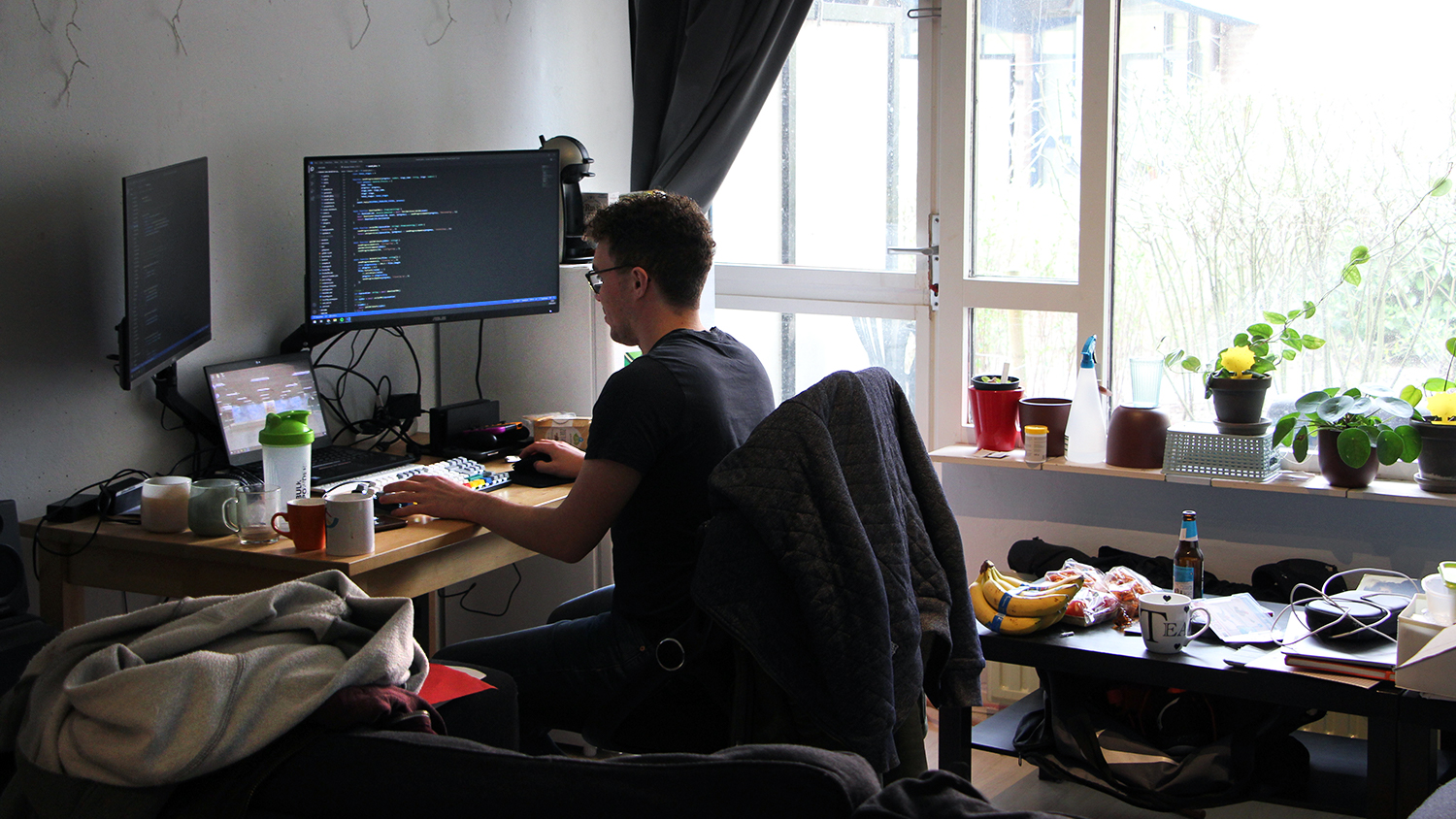 Quinten programming his social robot
Quinten programming his social robot
With such a busy life, we are of course curious to know whether he feels pressured to perform, like the majority of students in the Netherlands, according to recent research from the Dutch government (link in Dutch, Ed). He replies that he does feel such pressure, but only around exams. “I always score a 9 or higher for my programming assignments, but a 4 for exams. Examinations really stress me out. I recently took a resit and got a 5, so it was just enough to pass.” His average grade is 7.13, which he is “completely satisfied” with.
He does, however, suffer from imposter syndrome. “Sometimes I feel like I’m in a position I’m not qualified for. Take my job, for example. When they make me do something I can’t do, like setting up an application’s architecture, I wonder why they trust me. Yet, I never get any negative feedback. Maybe this has something to do with my insecurity. I used to see a psychologist, which is when this issue was brought to light.” His mental health is currently average, though, with a score of 3 on a scale of 5.
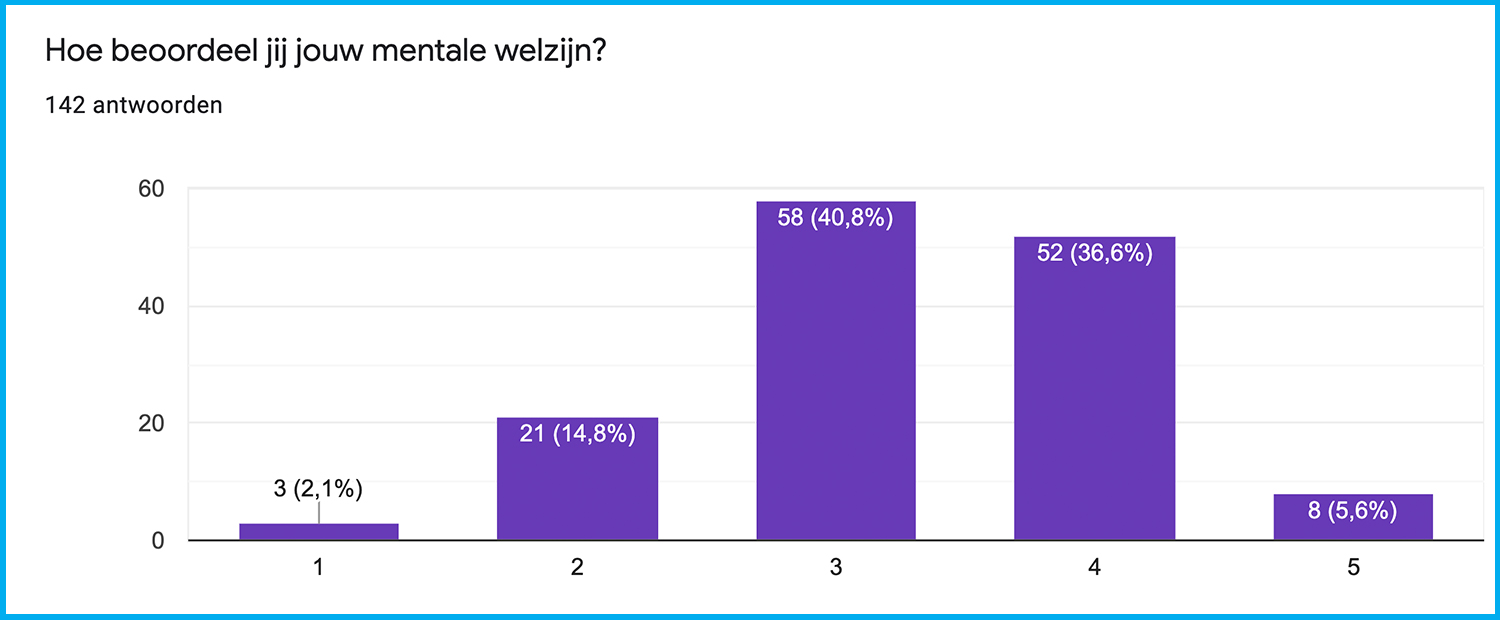
Asked to rate their mental health, most Dutch students (40.8 percent) gave it a 3 out of 5.
But Quinten shouldn't feel like an imposter for being featured in this article as an average UU student. Firstly, his favourite drink is beer. Secondly, he rents a room measuring between 16 and 20 square metres, for which he had to wait longer than six months. His diet is also quite average for a UU student: he drinks less than seven glasses of beer a week (yes, really), he eats about one ready meal a week and had a meatless day once a week.
Moreover, the number of sex partners he's had in his lifetime, between six and ten, matches the average for a Dutch student and he uses drugs occasionally but not regularly. He has had sex back when the Netherlands was on lockdown, like almost 70 percent of the students who completed our survey. He did it with his partner, which is the average answer as well. This result roughly matches data published by Rutgers in 2021 on the sexual health of young people during the pandemic. “I also feel really average,” Quinten says, laughing. But he does mean it.
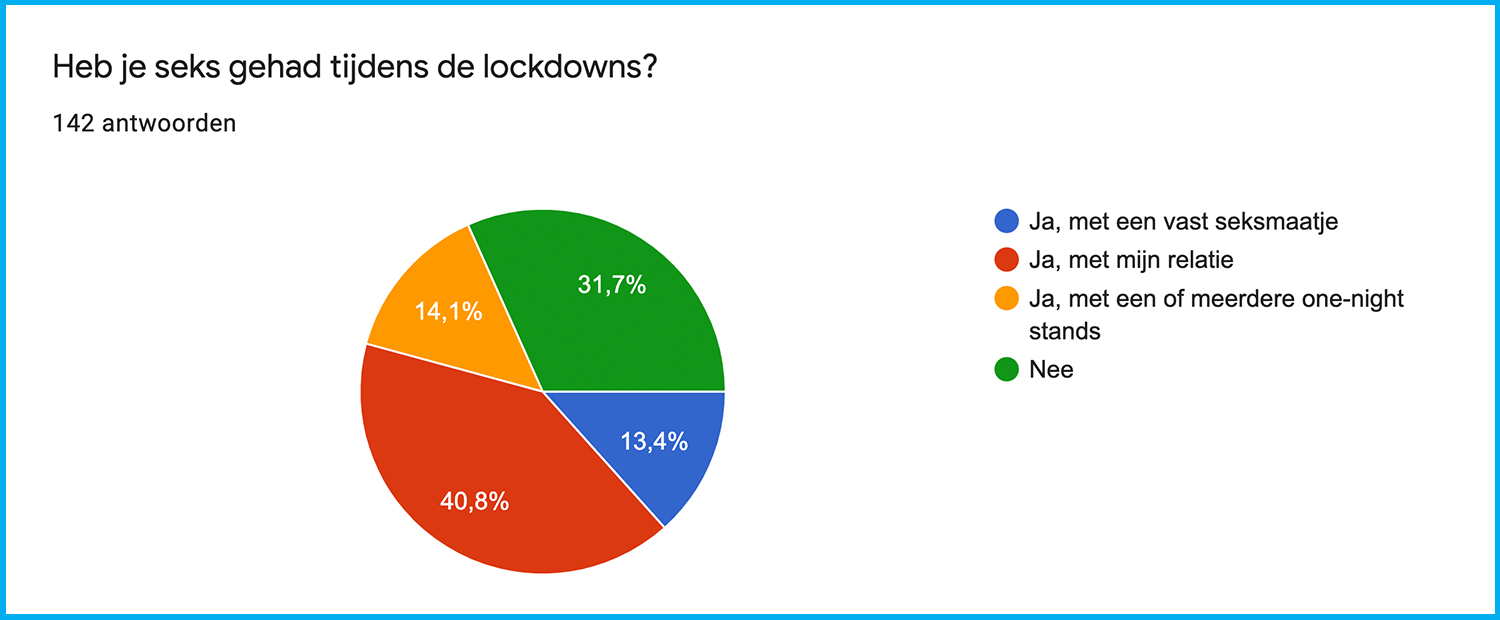
"Have you had sex back when the Netherlands was on lockdown? 40.8 percent of respondents said "yes, with a partner", while 31.7 percent said "no", 14.1 percent said "yes, with one or more one-night-stands" and 13.4 percent said "yes, with a friend with benefits".
Number 2, Britt: ’I didn’t expect to be so average’
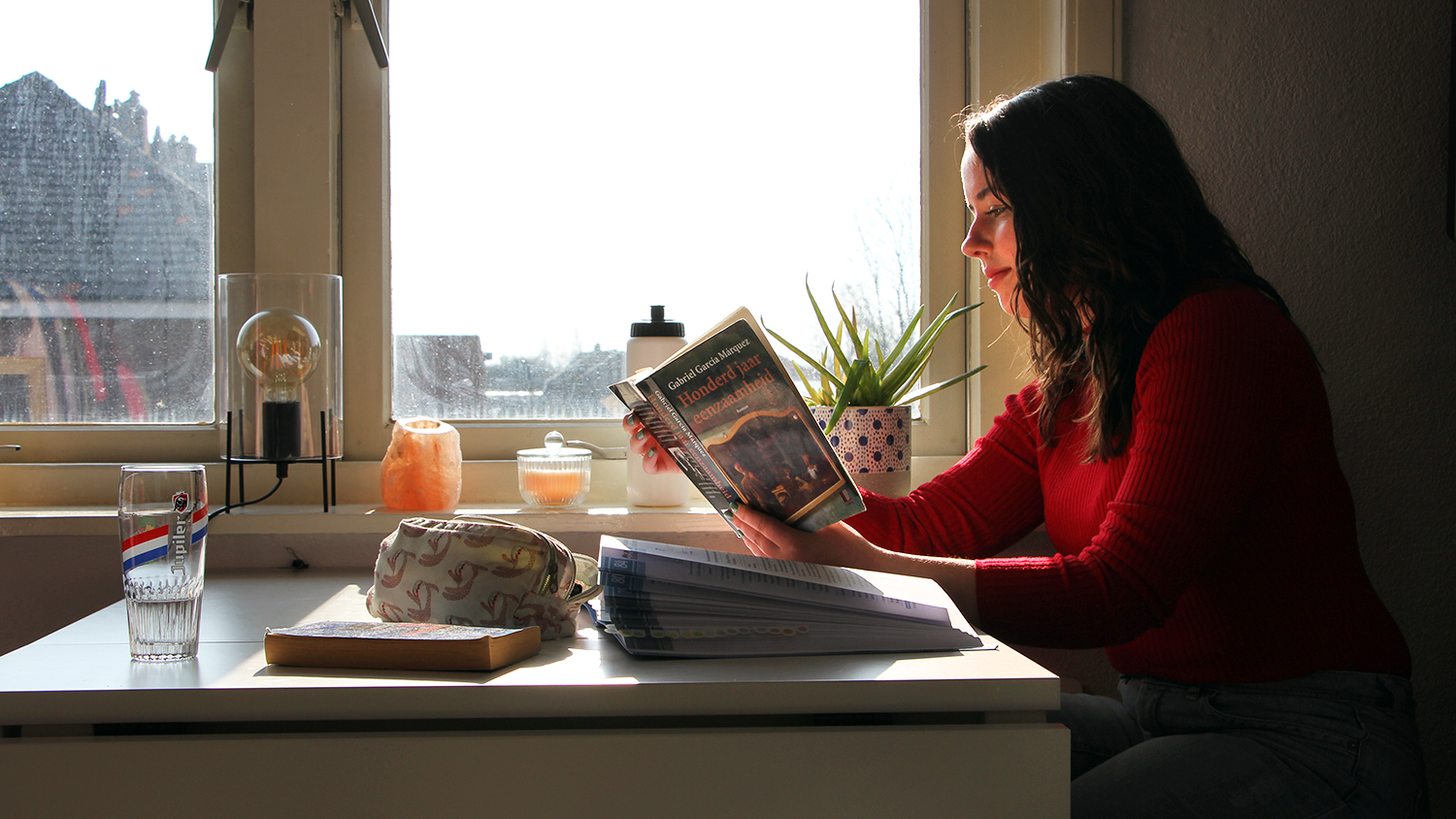
Average Dutch student Britt Peters reading Gabriel García Márquez while she should be studying
The same cannot be said of Britt Prins, who is in the third year of the Spanish Language & Culture Bachelor's programme. She filled out the survey for fun, while procrastinating from studying, and she was surprised when she heard back from DUB. Like Quinten, she scored average on points like room size, intimacy and relationships, loneliness during the pandemic, and the fact that she has been in quarantine more than twice. She is also average in other regards, like being a flexitarian and borrowing more than 400 euros a month from the government. She is 21 years old, close to the average of 22. Like the average student, Britt also spent more than four months looking for a place to live, so it is not surprising that she ended up in Zeist.
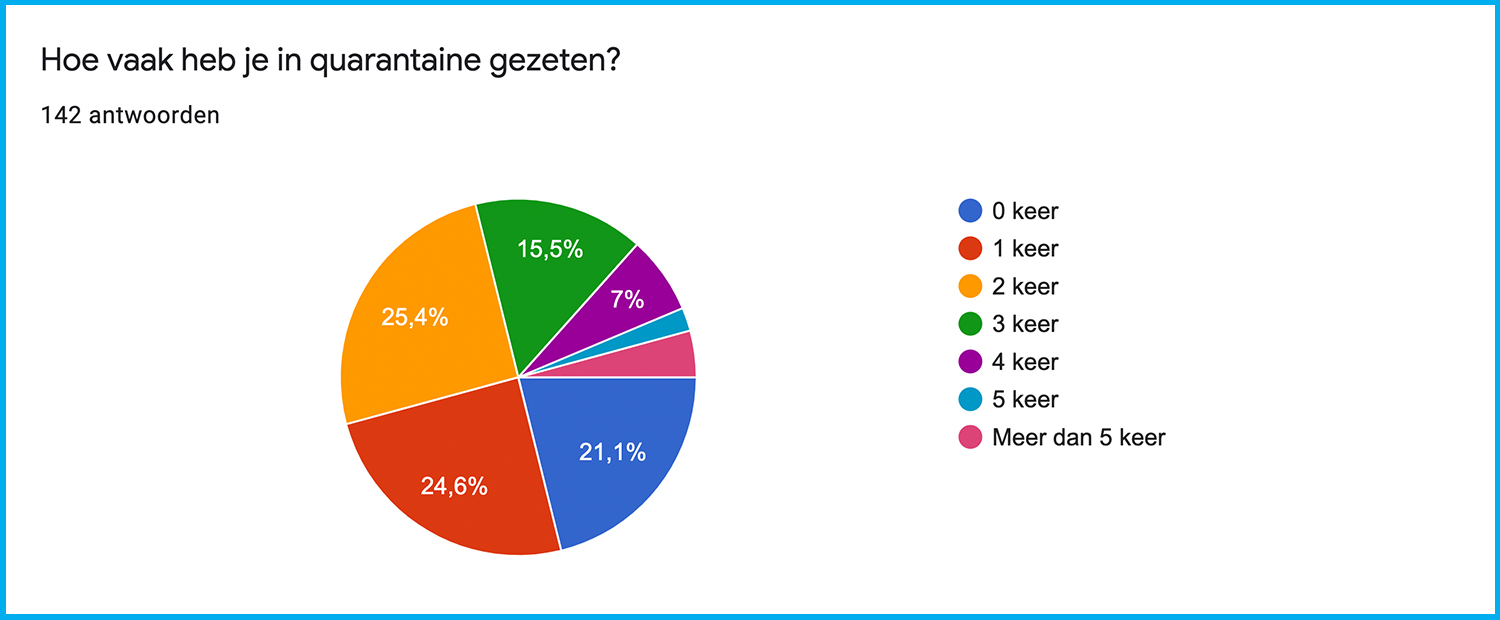
"How often have you been in quarantine?", asked DUB. Most Dutch students had to do it once or twice (each option received approximately 25 percent of responses), while an unlucky 15.5 percent had to do it thrice. 21.1 percent of respondents were lucky to escape the ordeal altogether.
Although it takes a while to get to the city centre by bike, Britt is very happy with her home and the seven roommates she shares it with – all women, all close friends of hers. “I have a ridiculously big TV. That’s why my room is the designated movie theatre of the house. We often sit together in the bed, huddled up against each other.” A common occurrence during the lockdown, when they missed the house parties that formed the foundation of their close bond. However, Britt must be careful when it comes to alcohol consumption, as it does not mix well with the medication she uses to treat acne. That's why she limits herself to five glasses a week, as does the average female Dutch student at UU. “If it wasn't for that, it would have been more.”
Unlike the average Dutch student, Britt does have international friends at UU. She is aware that most Dutch students refrain from making friends with their foreign counterparts, and reckons that the programme she pursues is the reason for having met many people whose native language is Spanish. In addition, she thinks her programme makes her more internationally oriented than the average Dutch student. For example, she and a friend have recently joined a buddy programme that pairs UU students with international students who have just arrived in the Netherlands.
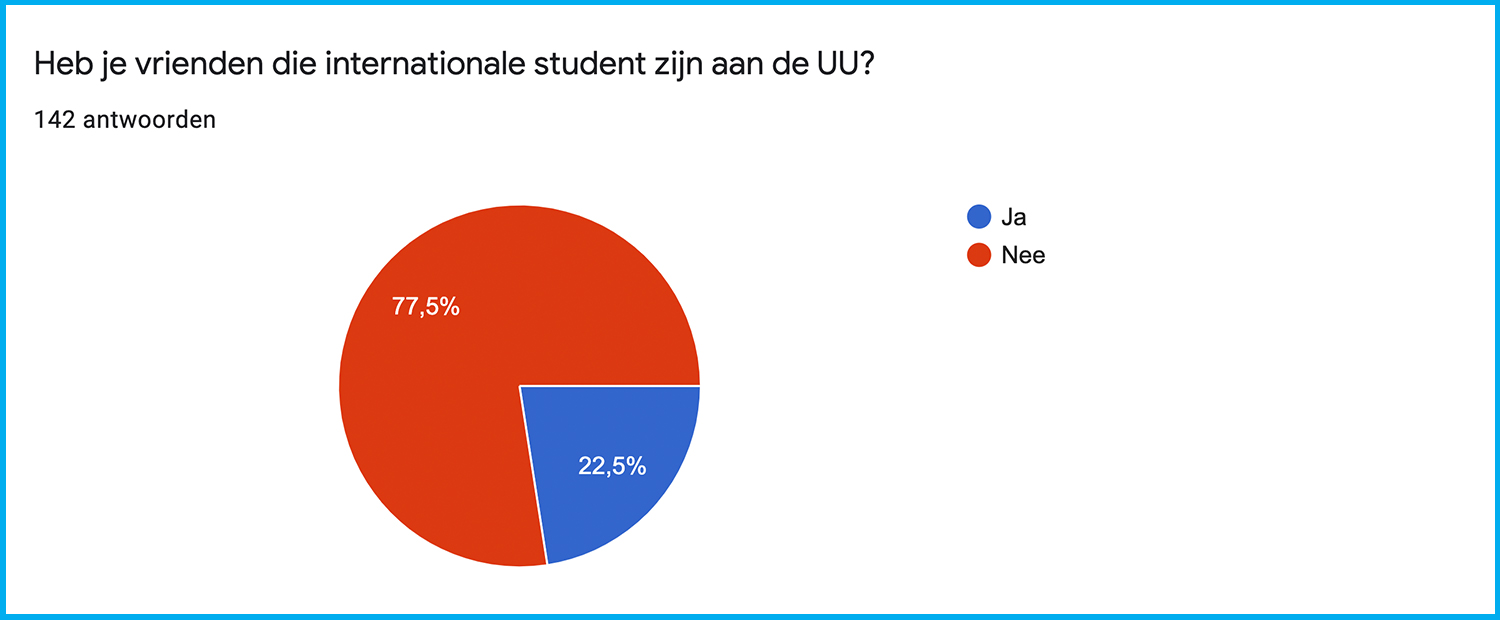
Asked whether they are friends with any international student, an astounding 77.5 percent of respondents said "no".
Although she enjoys her programme, Britt spends less than 25 hours studying every week, which is far below the average of 37 hours most university students in the Netherlands dedicate to studying. By comparison, she also spends about 25 hours a week on social media. “I’m basically addicted to my phone”, she admits. Britt is not proud of it, however, which is why she tried deleting all social media apps from her phone except for Whatsapp, but the draconian measure failed to lessen her urge for distraction. “Social media definitely affects my academic results”, the student acknowledges — and that, too, makes her pretty average. A survey from 2017 revealed that 35 percent of Dutch students find that social media negatively impacts their performance. Most of Britt's "low" grades are by choice, however. “I’m part of the ‘culture of mediocrity’. I have a life apart from my studies as well.”
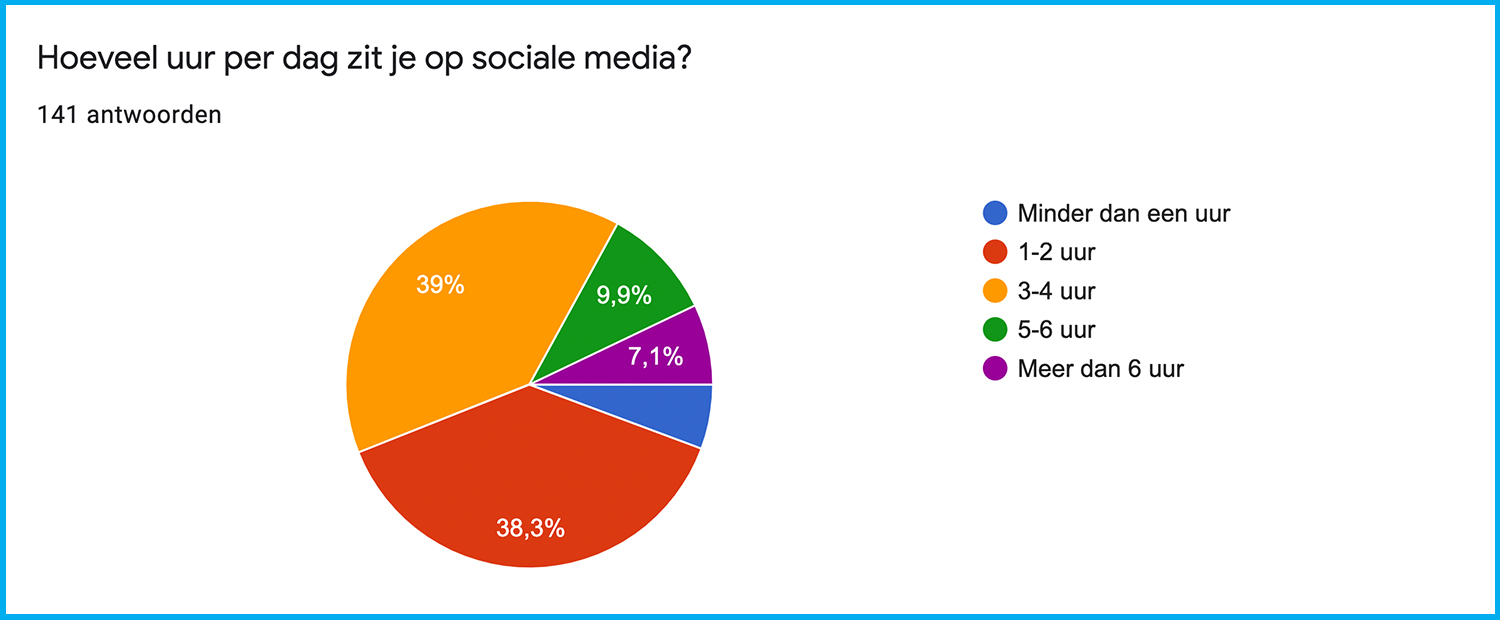
"How many hours a day do you spend on social media?", DUB asked Dutch students. About 38 percent of respondents said "between 1 and 2 hours", while 39 percent said "between 3 and 4 hours". Approximately 16 percent admit to spending more than 5 hours on social media each day.
Upon further questioning, however, it turns out that Britt has an ambition for which she does not want to settle for mediocrity: she would like to publish a novel someday. And she knows very well how much time and energy that takes. “I’ve tried so many times to get started. I did finish writing one book in secondary school, but it was rubbish. I tried again as a university student, but it just took up all of my time and my grades plummeted as a result. I spent so much time working on the book like a madwoman that I even forgot to eat. I hope someday I’ll be able to take a break for a year or two and really give it my all.” Additionally, Britt is a bookworm, whereas the average Dutch student has been dedicating less and less time to reading (news article in Dutch, Ed). But, since DUB's survey did not ask students how many books they read on average, Britt could not be judged on that. Her favourite book is One Hundred Years of Solitude by Gabriel García Márquez.
Number 1, Iris: I have figured out how to study as efficiently as possible’
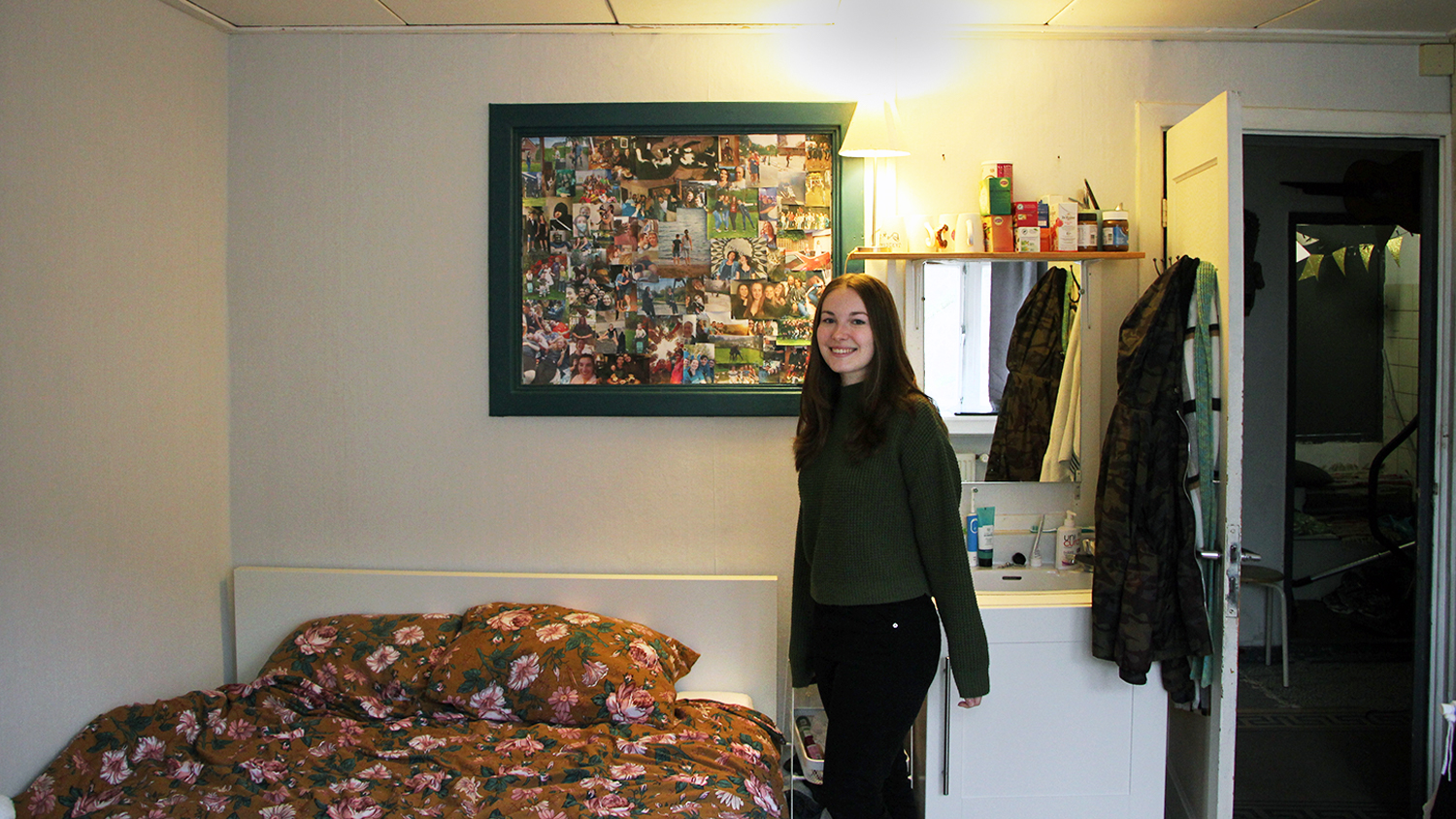 Average student Iris Jansen in front of a picture frame showing all of her good friends and family
Average student Iris Jansen in front of a picture frame showing all of her good friends and family
Iris Jansen is the most average student of our three winners. Like Quinten, she filled out the questionnaire just for fun. She studies Law – the UU programme with the highest number of active enrolments by far. She does not really understand why this programme is so popular. “After almost three years, I still don’t know what to do with it. I think more people in my programme can identify with that.”
Iris spends less than 25 hours a week on her studies, which is below average. “I have figured out how to study efficiently so that I can still get a passing grade with as little time and effort as possible. I scored very well in high school but the first year of college was tough. That’s when I learned that a 6 will do just fine.” However, on her free Monday evenings, she attends the Descartes College, which offers interdisciplinary honours courses for motivated Bachelor’s students at Utrecht University. She does so not because it looks good on her CV but because she enjoys it. “An expert came to talk about lie detection once. My group and I came up with a game in which we told two lies and one truth. The question was whether you would be better at lying if you told someone else’s lie. It was so much fun.”
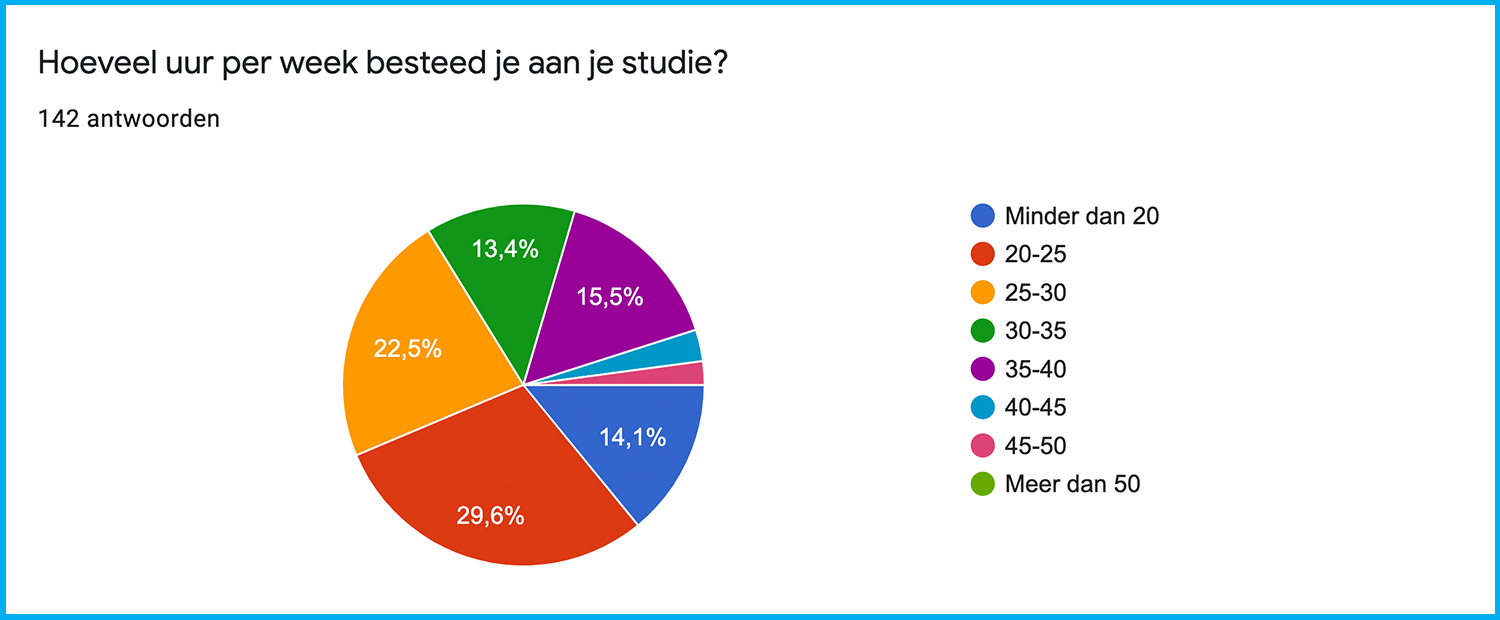
Dutch students are quite divided when it comes to the number of hours a week they dedicate to studying: Roughly 29 percent of respondents spend 20 to 25 hours studying, while 22.5 percent do it for 25 to 30 hours a week and 15.5 percent go as far as spending 35 to 40 hours studying.
Whether that is average or not, we honestly don't know, but Iris does not feel a particularly strong connection to Utrecht. The pandemic could very well be to blame, as this period generated a lot of stress and mental health issues for the student. Although Iris lives in a privately-owned student house in the popular Wittevrouwen district, for which she only pays 250 euros a month – a bargain, considering the average Dutch student in Utrecht spends 470 euros a month on rent – she visits her parents in Limburg (Southern Netherlands) often. That is why she did not develop a very close relationship with her housemates.
“Now everyone is kind of living their own lives. Before I moved to this house about two years ago, there were a lot of fun traditions like the Sugared Peanut Party. On April 1, the oldest roommate had to dress up in a peanut costume and eat sugared peanuts out of the hands of other people. But now he said he doesn’t feel like doing that anymore. Many people are busy with work, although we do still celebrate Sinterklaas every year". The last time they did it, her roommates made her a nice present and joked about the fact that they never knew where Iris was. Although she is partly to blame for spending a lot of time in Limburg, Iris regrets not being in touch with her roommates as much.
 The present Iris’ housemates made for her. Inspired by "Where's Waldo?", they ask: "Where is Iris?"
The present Iris’ housemates made for her. Inspired by "Where's Waldo?", they ask: "Where is Iris?"
Iris is, however, a member of the student volleyball association Van Slag and she has a nice bond with the team, with whom she usually has dinner before each game, not to mention they often stick around for a beer afterwards. Still, she doesn’t see them much outside of volleyball. “I like them very much, but I wouldn’t describe them as my closest friends. Close friends are people you share your deepest, darkest secrets with.” After 2.5 years of studying, Iris has two really good friends in Utrecht, one of whom she already knew back in Limburg. Her partner lives in Leiden together with some good friends that Iris met through online gaming.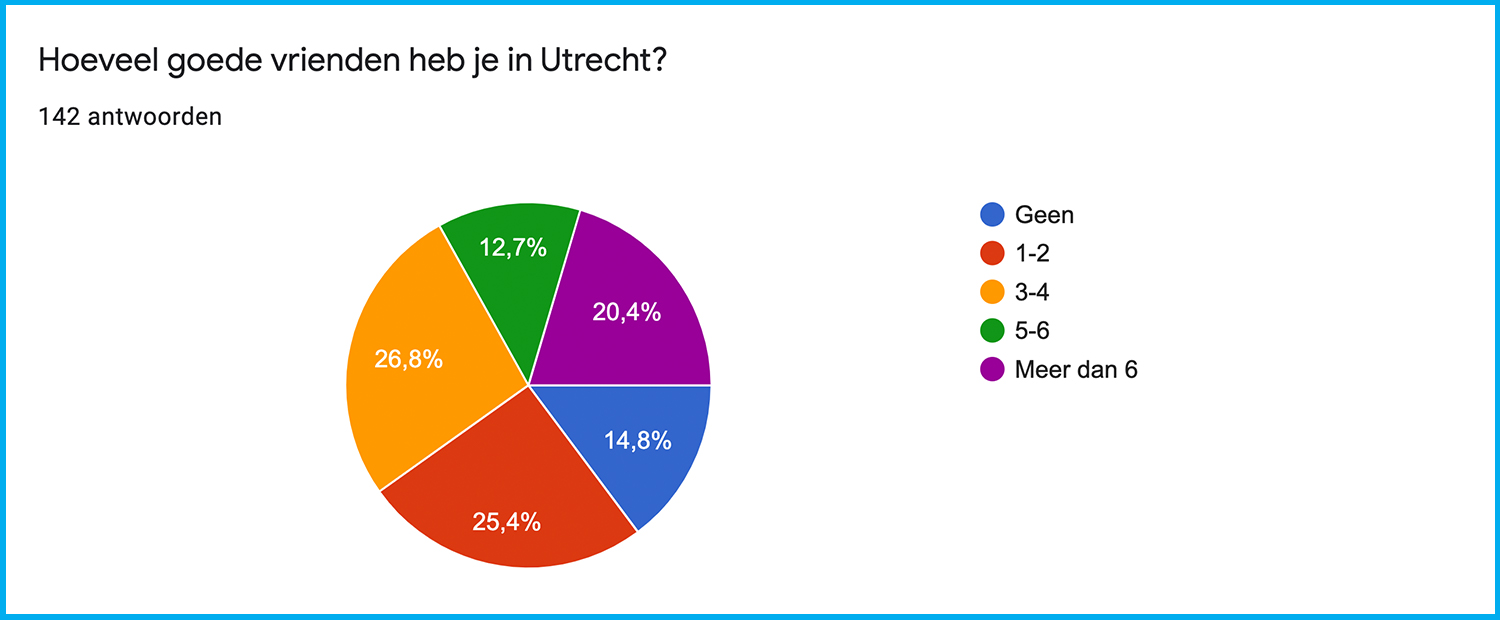
"How many close friends do you have in Utrecht?" A quarter of respondents said between 1 and 2, and another quarter between 3 and 4.
After completing her Bachelor’s degree, Iris plans to leave Utrecht. “I’m going to study Greek and Latin Language & Culture in Leiden. In the future, I’d like to teach at a secondary school and go back to Limburg, where I come from.”
We ask her whether it bothers her that her real ‘home’ is still in Limburg. “What I’ve noticed is that my Limburg accent stands out in Utrecht”, she replies. “Sometimes it feels like people tend to label me as stupid or dim-witted, even though that might not be the case. It’s as if you have to prove that you belong here just a bit more than others. Fortunately, my accent also has its advantages, as it can be a fun ice-breaker. Kind of like a party trick.”